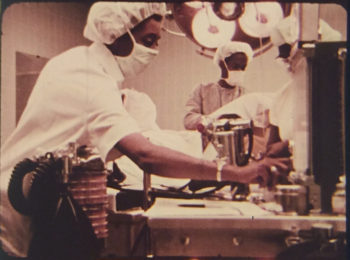
Film & Media Archive Completes Preservation of Rare Documentary

The Washington University Libraries’ Film & Media Archive has successfully completed the preservation of Code Blue, a 1972 recruitment film aimed at bringing minorities into the medical profession. The project was completed with the support of a Basic Preservation Grant from the National Film Preservation Foundation (NFPF).
Code Blue is one of the earliest existing films created by Henry Hampton’s Boston-based documentary company Blackside Inc., which produced the Emmy Award-winning civil rights series Eyes on the Prize. Blackside became the largest African American-owned film production company of its time and was home to many filmmakers from diverse backgrounds, including African Americans, immigrants, and women.
Hampton (1940-98) was a St. Louis native and 1961 graduate of Washington University. Founded in 1968, Blackside dedicated itself to documenting the civil rights and social justice stories of modern history with a special emphasis on the poor and disenfranchised. The Henry Hampton Collection is housed at the Film & Media Archive.
The idea for Code Blue began with Dr. Therman E. Evans, who wanted to encourage African Americans to enter the health professions. Evans approached the Blackside team about making a film about medicine that would appeal to youths. The 27-minute documentary, which was helmed by director, cinematographer, and co-editor Romas Slezas and producer and co-editor Howard Dammond, includes footage from an emergency room in Harlem, a tour through areas of Nashville with a doctor who did outreach to poor families, and discussions with young men and women from different backgrounds who could explain the value of medical education.
Code Blue helped to bring new talent into the medical field and was used in hundreds of high schools and medical training curricula nationwide for over 20 years. The film won a CINE Golden Eagle Award and was seen around the world, including at film festivals as far away as Venice’s Festival dei Popoli. It also helped to establish Blackside as a vital player in independent film production.
